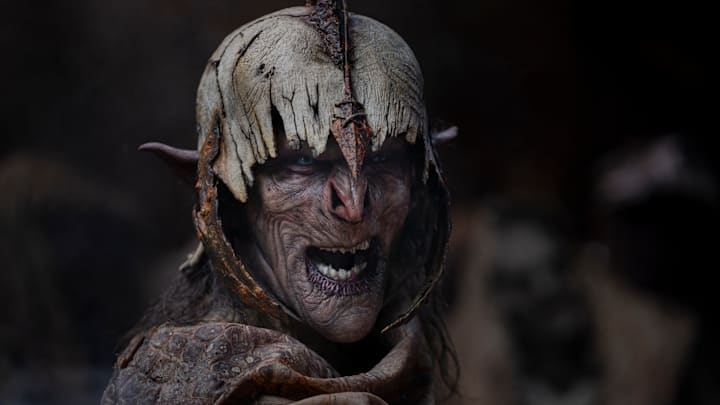The Iron Tower trilogy was the first work published for fantasy author Dennis L. McKiernan, beginning in 1984. The books tell the tale of an evil wizard who is trying to overwhelm the whole world through darkness and war. The three books — The Dark Tide, Shadows of Doom and The Darkest Day — are not without controversy.
The Iron Tower is a classic high fantasy epic where elves, dwarves, wizards, dragons, and other fae creatures play prominent roles. One could even argue that his writings are too similar to J.R.R. Tolkien's The Lord of the Rings, which popularized a lot of these tropes.
Is The Iron Tower trilogy too similar to The Lord of the Rings?
That McKiernan is heavily influenced by Tolkien cannot be debated. There are just too many similarities between their books. Instead of hobbits, McKiernan has warrows. They live in the Boskydells, not the Shire. Instead of wargs, he calls them vulgs. He has ruhks instead of orcs. Gyphon instead of Sauron. Modru instead of Saruman. Even Middle-earth and Mithgar feel similar. Instead of Mordor, there is Gron. You get the point. Brian Murphy of Black Gate made a lot of these criticisms clear back in 2011.
This comes as no surprise if you know the backstory behidn the books. McKiernan was in a serious motorcycle accident that left him bedridden for several months. The story goes that he began writing The Iron Tower while recuperating, with the intention of it being a sequel to the Lord of the Rings. The Tolkien estate passed on that idea, but fantasy publisher Roc was interested anyway. A few changes here, a few changes there, and The Iron Tower is what you get.
While Murphy and other critics have a point, they also are selling McKiernan short. In the Black Gate article, Murphy writes this:
"The deeper problem is that they’re imitations of style, not substance, and don’t engage in any of Tolkien’s underlying ideas. The result is a pretty vapid product. They strip LOTR of its literary qualities and reduce it to “mixed band of unlikely heroes on a quest to save the world” without any anchors to the human condition, mythology, or applicability to real world events."Brian Murphy, 2011
This is an unfair argument, because Tolkien wrote The Lord of the Rings under very different circumstances than McKiernan, which comes across in the story. Tolkien started writing LOTR in the United Kingdom during a worldwide depression, with a real-life Sauron gaining power in Germany and casting a shadow over all of Europe. He worked on it throughout World War II, when Great Britain was under almost constant threat.
McKiernan wrote The Iron Tower trilogy after the tumultuous 1960s and '70s in the United States, and after the Vietnam War had ended. The world was a completely different place than in Tolkien's day.
Also, Murphy does not account for McKiernan's later works. He penned 17 books that take place in Mithgar, spread out over a timeline of many thousands of years. Looked at from that point of view, The Iron Tower is just a snapshot of events that took place at one time on that long timeline. McKiernan does address larger and deeper issues in later works.
Yes, The Iron Tower does borrow heavily from the works of Tolkien, but not so much that the estate was offended enough to take legal action.
How does The Iron Tower differ from The Lord of the Rings?
Probably the biggest difference between McKiernan and Tolkien is readability. While The Hobbit is an easy read, The Lord of the Rings is tougher to get through. The language, the stilted writing style, and at times the pacing can make it difficult to muddle through. Its characters, incredible storylines, history, and its reputation encourage readers to continue.
McKiernan's style is very different. His books cover a lot of ground quickly and are just easier to read. Tolkien sprinkles in history throughout both The Hobbit and LOTR, and The Silmarillion explains that history further. McKiernan also mentions historical tidbits about Mithgar in The Iron Tower, but instead of The Silmarillion, which reads like an ancient religious tome, McKiernan has gone back and filled in his history with more traditional novels.
There are other differences. The warrows are much more capable in war than the hobbits as warriors. Female warrows play key parts in many of McKiernan's tales. Women characters in general play much bigger roles in Mithgar than they did in Middle-earth.
If you look just at The Iron Tower trilogy, then the similarities to Tolkien might be a problem for some readers, but if you take those books for what they were meant to be originally — a sequel to The Lord of the Rings — then read other books set in Mithgar, you will be able to discern the differences as McKiernan grows as a writer.
All of the Mithgar books tend to lean hard into the kind of high fantasy Tolkien made famous through his classics, and they pay homage to Tolkien throughout, but that does not diminish their value as standalone tales. Many of them do focus on a group of unlikely companions on a quest, but that is a key element in just about all fantasy, to some extent. The Iron Tower is easier to read and faster paced than The Lord of the Rings. Its critics do have valid arguments that it is too similar at times to the classic Tolkien stories, but that doesn't mean they can't be enjoyed.
To stay up to date on everything fantasy, science fiction, and WiC, follow our all-encompassing Facebook page and Twitter account, sign up for our exclusive newsletter and check out our YouTube channel.
